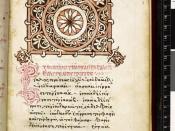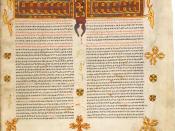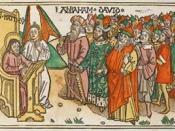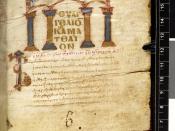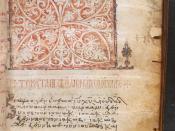The author of the first gospel is in a unique position. There is not a lot of dispute about the authorship of this gospel. In fact, the list of early church fathers that accept Matthew as the author is long and distinguished. As far as we can determine the authorship of the first Gospel is not disputed by any of the early church fathers. However the feature that makes the writer unique is that he is arguably the first person to codify the life of Jesus in written form. Whatever it is that he writes therefore has the possibility of affecting the remainder of what is accepted about the life and times of Jesus.
Starting with the assumption that the first Gospel was indeed written by Matthew the apostle, who was a Galilean Jew, we can attempt to understand something of the background and historicity of his writing. According to Luke 5:27, 29 and Mark 2:14, Matthew was a tax collector.
Because of this fact many of his Jewish contemporaries would have considered him a traitor to his heritage. He was a sellout to the very nation that held the Jewish people under their rule. It is highly unlikely that anyone would have attempted to falsely ascribe the writing to Matthew. If it were to have been given false authorship it would seem much more plausible that the writing would have been ascribed to someone held in greater esteem by his readers.
To further understand Matthew as a writer we should make some attempt to understand his Sitz im Leben or community. We are not making the assumption, as some do, that Matthew's work is a product of his community. Rather, that his Gospel perhaps was produced because of the need of his community and the need for the life of Jesus to be accurately recorded. "In several Matthean studies the community behind the document is characterized as a corpus mixtum, a mixed body of both good and bad members." Many have said that Matthew's background is a one of great turmoil. A mixed body of false and true disciples makes up his church. This could be used to argue as reason for his inclusion of certain teachings of Jesus i.e. the parable of the wheat and tares in chapter 13 or the parable of the laborers in the vineyard in chapter 20. However not all scholars concede that Matthew's community should be characterized in such a way. In fact Strecker's work describes the parable of the weeds only as an indication of the mixed culture of the world in Matthew's day and does not directly point to the character of Matthew's church or his particular community. Matthew, even though he may not be writing in response to his particular community, nonetheless is writing to a specific audience in which there are obviously some who need to hear these particular words.
Part of the reason for understanding Matthew's community is due to the debate over the language of the original text. There has been much discussion over whether or not the Gospel was originally written in Hebrew or a Hebraic language such as Aramaic. If Matthew was actually writing for the benefit of Jewish people specifically (an issue which will be dealt with on a deeper level later) then it does not seem implausible that he could have written the original text in Hebrew. However there are some difficulties that arise when considering a Matthew originally written entirely in Hebrew. McGarvey states that we must consider several facts.
"The essential facts in the case are the following: All of the ancient writers, whose extant writings allude to the question, represent Matthew as having written a narrative in Hebrew; but not one of them claims to have seen it except Jerome, and he subsequently expresses doubt as to whether the book which he saw under this name was the genuine Matthew. If a genuine Hebrew narrative at any time existed, it perished with the age which gave it birth. All of the writers just named were familiar with the Greek Matthew; and none of them speak of it as a translation. A large majority of the modern writers regard the Greek as the original, and it is a singular confirmation of the correctness of this opinion that Alford, who in the first edition of this commentary, took ground in favor of a Hebrew original, in the later editions acknowledges that he has been constrained to abandon that position." Considering all of this evidence we can logically conclude that the text was likely written in Greek although we cannot be 100% certain on this matter. Another uncertain area in regards to the first Gospel is the date of composition.
As with most other ancient documents the exact date of writing is impossible to discern. If there is one issue that is more hotly debated than date when looking at any ancient writing this commentator is not aware of it. So it is with Matthew. The later the date the less likely it is that the writing can be considered canonical or inspired. Of course, the earlier that the writing can be placed then the opposite is true. Again we cannot place the exact date of the Gospel, but we can look at evidence that points to an early time period.
Mcgarvey says that the early writers unanimously treat Matthew as the first of the New Testament books. The date of Luke, he states, is very definitely not later than AD 60. It is no surprise then that most conservative scholars agree with the early sources and therefore place the date somewhere before 60. As always though there are some who ignore the early patristic support of an early date. Schweizer places the date somewhere after 70 AD. "The content of the Gospel permits us to draw certain conclusions. It must undoubtedly be dated some time after AD 70." However, Schweizer's assumption is based on faulty logic. The content itself does not allow him to draw conclusions, however the content coupled with his notions of its truth can allow him to make conclusions. Therefore his supposed internal evidence of a late date of Matthew is purely based his low opinion of inspiration and consequentially his belief in a source theory for thw formation of Matthew's Gospel.
There are some other facts that can help us to narrow down the date a little more. Boles says that the earliest probable date is 38 AD. So taking into account our earlier late date of 60 we have limited the writing to a time period of a little over two decades. A shorter time than this commentator has been alive. This also limits the distance from the actual events to a time period just under thirty years. It would be quite difficult to falsify very much if any of the historical material involved because many of the people who were involved would have still been alive. Even the miraculous events have added credibility based on this fact.

